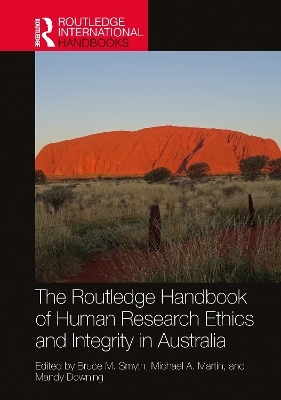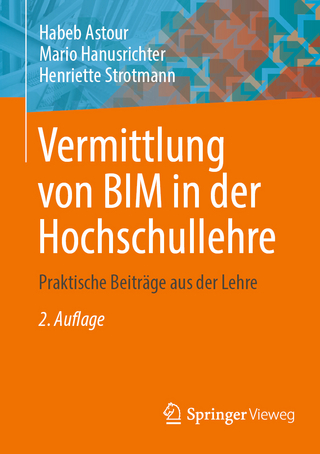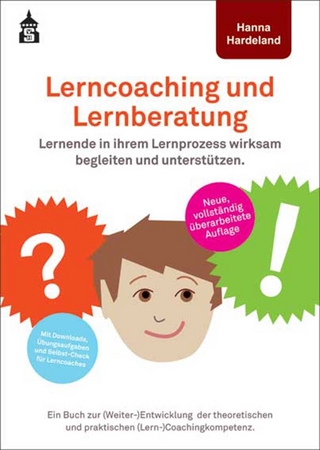
The Routledge Handbook of Human Research Ethics and Integrity in Australia
Routledge (Verlag)
978-1-032-33459-2 (ISBN)
- Lieferbar (Termin unbekannt)
- Versandkostenfrei
- Auch auf Rechnung
- Artikel merken
The Routledge Handbook of Human Research Ethics and Integrity in Australia highlights why it is important to look at the subject of human research ethics and integrity within the Australian context, and what the Australian perspective can offer to all researchers in the social sciences and humanities globally.
Australia has one of the world’s most rigorous ethics governance frameworks. This edited collection comprises 35 chapters, compiled with the aim of presenting human research ethics and integrity in a way that can be readily understood and applied by undergraduate and postgraduate students, early career and seasoned researchers, Human Research Ethics Committee members, and those who work in the administration of human research ethics. Chapters that focus on research ethics with Aboriginal and Torres Strait Islander people are likely to be of great interest to an international audience interested in Indigenous research ethics more broadly. This collection will act as a prism through which ethical ‘first principles’ can be seen afresh from the vista of contemporary Australian research ethics frameworks.
The issues raised in this collection are likely to resonate beyond the Australian context and will speak to researchers and educators in a variety of settings who find themselves grappling with thorny ethical issues ranging from the rapid evolution of data security and privacy concerns to research about cultural heritage and ethical approaches to Indigenous cultural and intellectual property.
Bruce M. Smyth is Professor of Family Studies with the Centre for Social Research and Methods at the Australian National University, Canberra, Australia. Michael A. Martin is Professor of Statistics in the School of Finance, Actuarial Studies and Statistics at the Australian National University, Canberra, Australia; and Chair of the Human Research Ethics Committee at the Australian National University. Mandy Downing is a Ngarluma Yindjibarndi woman and an Associate Professor with Curtin University in Western Australia, Australia; Co-Chair of the National Research Ethics Committee at the Australian Institute of Aboriginal and Torres Strait Islander Studies; and the Dean of Indigenous Futures at Curtin University.
PART ONE: SETTING THE SCENE 1. Human Research Ethics and Integrity: A Tale of Respect, Merit, Justice, and Beneficence 2. Research Integrity in the Australian Research Landscape: Reflections and a Plan for Action 3. Exploring and Managing Questionable Research Practices 4. Human Research Ethics Committees: Friend or Foe? 5. Legal Dimensions of Human Research Ethics; PART TWO: ETHICAL RESEARCH WITH ABORIGINAL AND TORRES STRAIT ISLANDER PEOPLES 6. Indigenous Research Ethics in the Australian Context: A Brief Introduction 7. Relevant Codes, Protocols, and Guidelines in the Context of Indigenous Research 8. The AIATSIS Code of Ethics for Aboriginal and Torres Strait Islander Research 9. On the Importance of Respectful Engagement with Australia’s Aboriginal and Torres Strait Islander Peoples 10. Protecting Indigenous Cultural and Intellectual Property in Research Collaboration; PART THREE: PRIMING ETHICAL PERSPECTIVES—EARLY CONSIDERATIONS 11. Researcher Safety and Welfare 12. Moral Injury in Research and the Responsibility of Ethics Committees 13. What’s the Point of Participant Information Sheets If No-One Reads Them? 14. Are We Paying Participants Enough, and When and How Should We Pay?; PART FOUR: RESEARCH METHODS AND ETHICS 15. Ethics in Quantitative Research: Commissions and Omissions 16. Randomised Controlled Trials and Quasi-Experimental Designs 17. Interviews, Focus Groups and Yarning: Some Associated Ethical Challenges 18. The Ethics of Archiving and Sharing Qualitative Data; PART FIVE: ETHICS ACROSS VARIED SETTINGS AND DISCIPLINES 19. The Ethics of Contemporary Criminal Justice Research 20. ‘This Is Doin’ My Head In’: The Ethics of Psychological Research 21. Ethno+Graphy and Research Ethics in Australia 22. The Ethics of Gambling Research 23. The Ethics of Socio-Legal Research 24. Pandemic and Public Health Emergency Ethics; PART SIX: FAMILIES, CHILDREN, AND OLDER AUSTRALIANS 25. Qualitative Research with Couples and Families: Six Ethical Issues 26. Research with Children: Balancing Protection and Participation 27. Ethics of Research with Older Australians; PART SEVEN: DIGITAL DATA, ARTEFACTS, AND SECURITY 28. Ethics Clearance for Digital Humanities 29. Ethical Issues in Human Research with Technology 30. Ethics of Research Using Digital Trace Data: A Computational Social Science Perspective 31. Cybersecurity Research and Society: Considerations for Researchers and Human Research Ethics Committees 32. Data Management Plans: A Risk-Informed Approach; PART EIGHT: OTHER THORNY ISSUES 33. Catching the Call: Dealing with Whistleblowing While Doing Research 34. Research Supervision: The Ethics of the Student–Supervisor Relationship 35. Publication Ethics and Peer Review
| Erscheinungsdatum | 07.09.2024 |
|---|---|
| Reihe/Serie | Routledge International Handbooks |
| Zusatzinfo | 9 Tables, black and white; 12 Line drawings, black and white; 1 Halftones, black and white; 13 Illustrations, black and white |
| Verlagsort | London |
| Sprache | englisch |
| Maße | 174 x 246 mm |
| Gewicht | 1060 g |
| Themenwelt | Sozialwissenschaften ► Ethnologie |
| Sozialwissenschaften ► Pädagogik ► Erwachsenenbildung | |
| Sozialwissenschaften ► Soziologie ► Empirische Sozialforschung | |
| ISBN-10 | 1-032-33459-2 / 1032334592 |
| ISBN-13 | 978-1-032-33459-2 / 9781032334592 |
| Zustand | Neuware |
| Haben Sie eine Frage zum Produkt? |
aus dem Bereich


